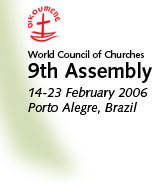 |
WCC > Home > News & media > News | ||||
| About the assembly | Programme | Theme & issues | News & media | |||||
 |
|
||||
|
13.02.06
Christian women of the world united
More articles and free photos at
Society, and particularly the roles of men, need to be re-organized as a pre-requisite for meaningful social transformation and so that women can be mainstreamed into church and society, World Council of Churches (WCC) general secretary, Rev. Dr Samuel Kobia has said.
Kobia made these remarks during a dialogue with women delegates attending the WCC’s pre-Assembly consultation from 10-13 February.
Consultation moderator Rev. Irja Askola from Finland, who welcomed Kobia after a brief performance of singing and dancing by a group of African women, told him, “Brother Sam we are behind you, you are not alone.”
Kobia said that in the last century, the change in women’s roles from that of homemakers to working outside the home had had an impact on women and family life, but that this had not yet led to changes in men’s roles. “The role of men needs to change for the transformation to make sense in this Assembly and beyond,” Kobia emphasized.
Weeping, regarded by patriarchal societies as a sign of weakeness, can be transformed into an act of empowerment and healing, said Dr Elaine Neuenfelt in another session.
Neuenfelt, who is professor at the Superior College of Theology in Porto Alegre, Brazil, said in an applauded presentation that in the Bible, the weeping of women is a prophetic exercise that gives testimony of the word of God in daily life.
Mrs Louse Bakala Komouno from the Evangelical Church in Congo Brazzaville said there were very few women in church leadership positions in sub-Saharan Africa, and urged the church to give training to women so that they could take up such positions.
Mrs Britt Agrell, an observer from Sweden, supported the idea that the Assembly theme should be like a prayer because “even when you have concrete plans, you also need a prayer”.
Sylvia Lisk Vanhaverbeke, chair of World Day of Prayer International (Canada), observed that since the Holy Spirit has no gender, the church needs to be on the leading edge of social transformation by setting an example of women becoming visible as leaders in faith.
“Women love the church and are committed to contribute to the renewal of the ecumenical movement” as well as to building links of solidarity between those women divided by a broken and divided church, Kobia observed.
He proposed alternatives, including supporting economic justice, that put the emphasis on just communities, just relationships and a protective attitude to the earth, thus recognizing the value of the caring role played by women in society, church and nation.
“It is an economy that is bigger than the production, distribution and consumption of goods and services that are sold in markets. This is a model that deserves to be explored as an alternative economic paradigm to the present unjust world economic order,” Kobia said.
Another alternative was eco-feminism, that draws parallels between violence against women and violence towards the environment. Kobia also mentioned the agenda to make water a human right and a common good for humanity. Activists on this issue oppose the privatization of water as it has become a source of conflict for the people who were close to earth, the Indigenous people, he noted.
At the end of the exchange, the WCC general secretary warned that men in leadership positions would not give up power easily. Therefore, women should continue in their struggle for social transformation, he declared.
Assembly website: www.wcc-assembly.info
|
|||
|
|
|

